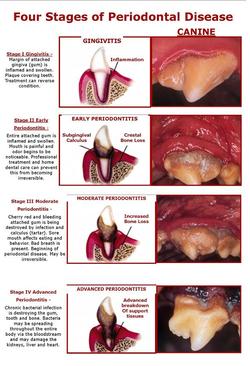February Dental Discount Month
St. Francis Pet Clinic Celebrates National Pet Dental Health Month
By Danielle Scott, M.E.S.M.
Did you know February 1st begins National Pet Dental Health month? Veterinary Medicine has dedicated an entire month to educating and promoting the importance of oral hygiene for our four-legged family members. Periodontal disease is the most common condition affecting both cats and dogs, however it is entirely treatable and preventable with at home care and routine dental prophylaxis. Left untreated dental disease is not only painful, but has the potential to affect major organs in the body, such as the heart and kidneys. St. Francis Pet Clinic celebrates dental month by offering 20% off routine dental services to encourage owners to treat their pet to a dental cleaning.

Why is dental disease so common in pets? While genetics play a role, dental disease also occurs due to the lack of oral hygiene. As a result, plaque accumulates and calcifies to becomes tartar. Left unattended the tartar builds up causing gum inflammation, gingivitis and gingival recession, amongst other issues; not to mention the bad breath! While home brushing is highly recommended, initiating it once these issues have begun will not reverse the dental disease unless your veterinarian performs a thorough dental cleaning.
Does my pet have to be anesthetized to perform a dental cleaning? Yes, we must anesthetize your pet to perform a thorough dental cleaning. A great deal of dental disease occurs above the gumline, thus requiring subgingival scaling. An awake pet will not comply with this procedure as it is uncomfortable. Further, a thorough oral exam can not be completed without anesthesia. A lot of dental disease goes unnoticed and untreated with anesthesia-free dentistry often leaving your pet in pain and resulting in progressive disease, tooth decay, potential tooth root abscess or even tooth loss. In fact, many operations perform anesthesia-free dentistry illegally. The law states performing dentistry on animals must be done under the supervision of veterinarians and these practices are often performed by groomers and in pet stores. Unfortunately, violations of laws involving animals are low priority for enforcement agencies, therefore these practices are continuing to exist causing harm to our pets.
What is involved with an anesthetic dental procedure? We take all the necessary precautions to safeguard your pet’s health and safety while under anesthesia. The veterinarian will perform an exam and run a pre-anesthetic blood panel to inform us how your pet’s body is functioning internally. This will indicate or rule out infection, anemia, or abnormal organ functions. We place an intravenous catheter and your pet will be on continuous IV fluids for the day. This establishes access to the circulatory system, and it maintains the blood pressure during anesthesia to promote sufficient blood supply to vital organs. It also prevents dehydration. The dentistry component involves ultrasonic and hand scaling to remove the thick tartar from the teeth. We probe the gums to check for any pocketing, which would indicate a diseased tooth. We offer digital dental radiology that can diagnose the degree of dental disease. Lastly, we polish the teeth using a rotating rubber polisher. Your pet is hospitalized for the day under the veterinarian’s care and will be able to go home in the early evening.
St. Francis Pet Clinic operates Monday through Friday 7am to 7pm and Saturday from 9am to 5pm. The staff is readily available to answer any further questions you may have. Call (805) 963-0577 to request an estimate or to book your appointment.




